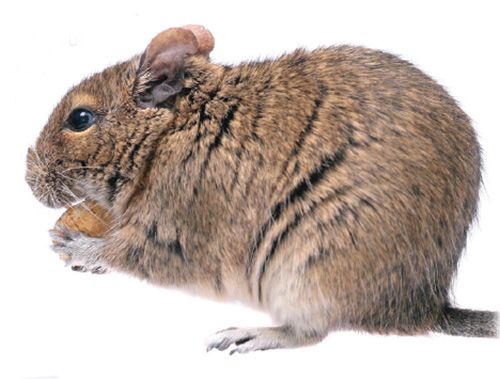Are you ready for a Degu?

Degus originate from Chile where they live in large colonies in deep burrows underground. They love to burrow but are also great climbers. Over the years they have become very popular pets as they play during the day and sleep at night.
Degus are very sociable animals so it is advisable never to buy just one single degu. Two degus of the same sex and from the same litter should live happily together. They have a life span of 6 to 9 years old and will grow between15-20 cm (6-8 inches).
Your degu will need to be handled daily, fed and exercised. Don’t be fooled by their size as they are still a big commitment and you must ensure you can take on the task of providing a long and lasting home to your new family member.
Selecting your Degu
My Degu has orange teeth
The teeth of a healthy degu are orange while white teeth tend to be the sign of serious diseases. Contact your local vet if you are concerned.
Buying your Degu
Always purchase from a reputable pet shop or breeder.
What to look for
A healthy degu should be bright and alert and able to move around its cage easily. Its coat should be glossy and clean with no bald patches or skin sores. Look out for signs of breathing problems and discharge from the eyes, ears, mouth or nose.
How old should my Degu be?
At least 7-8 weeks old when you buy them.
Pairing
Degus are sociable animals and thrive while living in pairs. Two degus of the same sex and from the same litter should live happily together.
At home with your Degu

Provide your degus with as large as cage as possible. A large glass tank will make an ideal home as they are known for chewing plastic cages. Ensure that the cage has a secure lid so that they cannot escape and that it provides sufficient ventilation.
Layer the cage with wood shavings and provide plenty of rocks for hiding and a variety of different levels so that they can climb within their cage. A solid exercise wheel can also be provided. To satisfy their tendencies to carry things around, provide them with a selection of non-plastic toys, which you can rotate so they don’t get bored. You will also need a box, which you can line with hay or shredded paper to allow them to hide.
Allow your degus 24 hours to settle into their new surroundings without handling them.
Handling a Degu
Degus need to be handled with care, with special attention paid to their tails, which are easily injured. Never pick them up by their tail, as they are very fragile. If their tail is injured they will shed part of it as a defence mechanism.
Degus only bite when they are frightened or handled badly. If you take your time and handle with care, your degus will soon become to trust you and enjoy being handled.
Grooming & dust baths
Degus groom themselves with their paws and love rolling around in a dust bath. You will need to place a bath full of chinchilla sand in their cage for them to use. For a special treat, scratch your degu behind its ears. If they let you do this then it wont be long before they let you scratch their bellies, which they really enjoy.
Diet
Degu food will provide a suitable diet, chinchilla and guinea pig food can be used as an alternative if they are free from molasses, which is bad for degus. The basic diet should be supplemented with hay. You can provide your degus with carrot and cucumber occasionally but not too often because fruit is high in sugar which can cause diabetes in degus.
Never give them any type of fruit because they are rich in sugar.
Keep your degus supplied with fresh, clean water in a gravity-fed bottle, which should be cleaned regularly.
